- Home
- Catherine Coulter
The Courtship Page 11
The Courtship Read online
Page 11
“You and I are involved, sir, but not in a trivial sort of enterprise. We, sir, are involved in a mystical quest. We were only temporarily derailed because of the weather. The weather is lovely this morning so there is nothing else to distract us.
“Pay attention to the road, Lord Beecham. Luther has an eye on that delicious thick goosegrass over there.”
“Luther,” he said very quietly to his horse, “you will not act like a bloody woman and hare off on your own, particularly with me on your back.”
His horse snorted and Helen laughed.
There were times when a man had no other viable choice but to cozy up to defeat. Lord Beecham cozied up for the remainder of their ride to Dereham.
Vicar Lockleer Gilliam, a distinguished gentleman of fine parts who was also a father of two grown children and a widower pursued by every unmarried lady over forty years of age in his flock, ducked his head into his own small study, which currently housed his brother’s manuscripts and books, a nobleman who had studied at Oxford with his brother, and Miss Helen Mayberry, a strapping young woman he would have courted with all the passion in his soul if only she had not been only eight years old twenty years before.
Lord Beecham and Miss Helen Mayberry were both absorbed in what they were doing—namely, poring over those old parchments, mainly shaking their heads because they had not yet succeeded in finding what they were searching for. Dust had formed a light sun-streaked film in the air.
Helen was on her knees in front of a huge parchment manuscript spread out on the lovely Flemish carpet given to the vicar by Lady Winfred Althorpe, who was now, thankfully, remarried. “This isn’t it,” she said. “It’s close, but not close enough.”
Lord Beecham looked over. “Yes, it is close. It’s Aramaic.”
“A cup of tea, my dear?”
“That would be marvelous, Mr. Gilliam,” she said, blinking up at him. “You are very kind. Oh, dear, look at all the dust we’ve raised in here.”
He waved her back when she started to get up. “No, you two remain doing what you’re doing. I will see Cook about the tea.”
Thirty minutes later, their empty teacups set aside, Lord Beecham shouted, “I’ve got it, Helen. Eureka, I’ve got it!”
She was on her feet in an instant. He was bending over the vicar’s desk, a very old vellum book open in front of him.
“What is it?”
He looked up at her, his dark eyes even darker now with excitement. There was no indolent, world-weary nobleman in his look now. Lord Beecham was fascinated, he was exhilarated. He was, in short, thrilled to his toes.
“I’ve found it. I’m sure of it. Look, Helen, just look, and tell me if you don’t think this is it.”
She looked over his shoulder. She hummed while studying the script. “I think so,” she said. “See that strange-looking figure that is repeated many times? It’s identical. What is the language?”
“It’s called Pahlavi. The alphabet developed from the Aramaic, which is why it looked so similar. Pahlavi was the writing system of the Persians around the beginning of the second century B.C. It lasted until the advent of Islam toward the seventh century A.D. The Avesta—that’s the Zoroastrian sacred book—is written in a form of Pahlavi called Avestan. Oh, God, Helen, this is just amazing. To find something like this—” He broke off, gave her a big grin, and clasped her around the waist. He lifted her over his head and swung her around. “We found it. Imagine: Pahlavi, a language so old that it has long been gone from this earth. Just to say the word makes me want to laugh and shout. Think about it: someone actually wrote the leather scroll more than a thousand years ago and we have it here with us, today, in modern times.”
He let her down, kissed her mouth, then immediately released her. He was soon bending over the text before him.
She stared at him for a moment, then looked down at the book with the strange writing that was surely identical to the writing on the leather scroll. He was talking to himself as he trailed his long fingers lovingly over the words.
“Tell me about it,” she said. “Can you translate our leather scroll?”
“I’m going to try my damnedest. It will be difficult, very difficult, because it was the Pahlavi custom to use Aramaic words to represent Pahlavi words. So take our word “king.” It’s shah in Pahlavi, but it’s spelled exactly like the Aramaic word malka. And the thing is, you have to read the Aramaic word and translate it instantly into Pahlavi, and read it as shah. So you’re always having to go back and forth in your mind to find the right words. It makes it very difficult to translate, much less simply read. But I can do it, Helen. Given enough time, I can translate the leather scroll.”
He turned, grinning from ear to ear. “What’s wrong?”
“What if the leather scroll has nothing at all to do with the lamp?”
“Come, Helen, you always knew that was only a remote possibility, despite that you found it on the east coast of England. Why should it? But don’t despair just yet. The fact of the matter is that we know the lamp came originally from the Holy Land. We are in roughly the right geographical area. Whatever it says, it will be fascinating, an incredible find, and you, Helen, you are the one who found it and gave it to the world. When it finally comes out, I can imagine scholars from all over Europe coming here to see it.” He rubbed his hands together, gave her a vague pat on the shoulder, and looked down once again at the parchment pages.
“But why would a Pahlavi scroll be buried in an iron cask in a cave on the east coast of England? If it was brought here by the Romans when they invaded England, why would it not be written in Latin?”
“I don’t know, but we will find out. Don’t worry. Your partner is an able fellow.”
They spent the next two hours searching for more manuscripts that would help Spenser translate the leather scroll. “There,” he said at last, rising and brushing his dusty hands on his riding breeches. “We’ve got three sources. It is more than I expected to find. It will do.”
It was late afternoon when they left the lovely mellow peach brick vicarage, set just behind the old church amid a beautiful wild garden. There were three ladies having tea with the vicar. “The poor man,” Helen said in a low voice. “He is mercilessly hunted. His poor wife died just thirteen months ago, around the same time as his brother and your mentor, Sir Giles Gilliam.”
“I would say that vicar Gilliam is enjoying himself immensely.”
Lord Beecham didn’t lose any more of his guineas to Lord Prith at whist that evening because immediately after dinner Helen told her father that Spenser was her partner and she needed him.
Lord Prith said only, “I understand he is your partner in this lamp business, Nell, but the dear fellow is such an excellent loser at whist.”
“You can filch his guineas when he is of no more use to me, Father.”
“Ha,” said Lord Beecham, but his step was energetic, excitement rippling through him. He couldn’t wait. They’d had only a few moments when they’d arrived back at Shugborough Hall to look at the leather scroll before changing for dinner. They had looked just long enough to be absolutely certain that the scroll was written in Pahlavi.
When Helen left him at eleven o’clock that evening, he was still hunched over the manuscript, sometimes writing, sometimes cursing, sometimes humming with pleasure. She doubted that he had even heard her close the door.
She fell asleep immediately and dreamed she was holding a lamp tightly against her chest. She couldn’t breathe. She squeezed the lamp harder. Suddenly a strange thing happened. The lamp became a man, a large man who was smiling down at her even while he caressed her flesh. The man was Spenser.
She roared upright in her bed, her breath whooshing out. Oh, goodness, she thought. Every detail of the previous afternoon stood out stark and magnificent in her mind. She was shaking with the power of all those details. She swung her legs over the side of her bed.
It was one o’clock in the morning when she slipped into her study to see Lord Be
echam fast asleep, his head on the desktop, not an inch from the leather scroll, the three manuscripts from Vicar Gilliam’s covering the remainder of the desk.
A candle was nearly gutted at his elbow.
There were pages on the floor beside the desk. She went down on her knees and picked up the top sheet. Written in his strong hand was:
From King Faval to his . . ? . . in Alexandria .... .. ? .. a holy man sought to secure my soul for his master . . ? . . the lamp is not real, it is from the other . . ? . . is it a gift from God or the devil? . . . he died screaming blasphemies, he cursed me for his end but he killed himself . . .
“Helen, why are you crying?”
“It is the lamp, Spenser, the manuscript is about the lamp. I’m crying because I’m so happy. It is good or evil? It isn’t real, it is from the other. . . . Oh, goodness, look at all you have accomplished.”
She jumped to her feet and threw herself onto his lap. He caught her to him as the chair collapsed and they sprawled onto the floor, Helen lying on top of him.
He was laughing so hard he couldn’t catch his breath. “I’ve never laughed like this in my benighted life. Get off me, woman.” His arms went around her. “No, I wish to change my order. Don’t move.” He grabbed a fistful of her loose hair and pulled her face down to his. He kissed her, lightly, then he rolled over on her. It quickly became something else, something urgent and frantic, and he wanted her so much that he knew, simply knew, that he would fall lifeless in a heap beside her if he couldn’t have her now. He didn’t stop kissing her as he jerked up her nightgown. His warm hands were on her thighs, her belly, caressing her. “Oh, my God, Helen, I must have you now.” He got his breeches open and reared over her.
His fingers were on her, her scent swamping him. He managed to focus in that moment on her face. Her eyes were the blazing blue of a stormy summer day. Her lips were parted, damp from kissing him. Her breasts were heaving.
And she whispered, arching up to him, “Spenser.”
He nearly went over the edge just looking at her, just hearing her say his name like that. He gritted his teeth, lifted her hips, and came into her hard, so deep he thought he would die from the power of it. Her arms were tight around him, but he had enough sense, enough experience, to pull out of her, breathing so hard he thought his heart would burst from his chest, and caress her with his fingers. He was staring down at his fingers, at her, his look so intense, so filled with the pleasure of it, that in a minute, no more, she yelled out his name, heaving against his fingers, and he watched her face in those precious moments, her pleasure tearing through him as well through her. He came into her again, deep and hard, wondering how he had survived all these years without her, and soon, too soon, it was over, and he knew he’d given his all, there was nothing else in him, and he was content. They were pressed tightly together, panting, and he was still kissing her, unable to stop.
He was still breathing hard, his breath hot in her mouth, and she whispered even as she licked his chin, “I don’t believe this.”
He reared up over her, balanced himself on his elbows, and said, “This isn’t what I am used to, either. No, that is ridiculous. Of course I am used to this, it is just that something has happened, something—” He stopped talking, just stared down at her, and frowned. He was also still deep inside her. He looked to be in pain. “Oh, Helen,” he said, and moved, arching his back with the instant power of it. “My God, Helen.” And he began moving again, deeply, and then, suddenly, he pulled out of her, lifted her hips, and gave her his mouth.
Helen arched and twisted as if she’d been shot. He held her firmly until she gave it up, yelled his name, and collapsed even as he came into her again.
“No,” he said, panting as if he had just run all the way from Court Hammering, “I don’t believe this. A man doesn’t do this every three seconds. It is madness. I will topple into an early grave. No, I must control myself. No, Helen, don’t you dare move. Oh, no, it is too much.”
“It was at least three minutes,” she said. She didn’t move. Actually, she doubted she could move if this roof fell in on her. She was sprawled beneath him, pinned down by him, and she clasped her hands around his neck and brought his mouth back down to hers.
12
AT LEAST TEN MINUTES passed this time before he was once again moving deeply in her, more easily now, but soon enough it quickened, and he was a madman once again, his mind splintered, all his focus on her and how he couldn’t get enough of her or get deep enough inside her. He wanted to possess her, to brand her, to imprint her, it was that simple, that final. He caught her cries in his mouth, felt her nails digging into his back, and climaxed as wildly as he had the first time.
“I will die now,” he announced to the silent, small room, his hot breath in her left ear. Her hair was tangled around her face, over her shoulders, her mouth red and swollen, her nightgown bunched up about her breasts. He was still inside her, but not so much now—after all, a man had to retreat sooner or later.
It was definitely later.
“Yes,” she said, “I will, too.” The sound of her frantic heartbeat was not so loud now in her ears. As for his heartbeat, it pounded deep, steady thuds against her breast. She said, her voice both surprised and bewildered, “I never imagined there could be anything like this. I have read many different books, looked at many different drawings. Never was there anything written or drawn that contemplated what you have just done to me so many times in so few minutes.”
“You mean what you and I have just done together,” he said. “I promise you that I could not have done this without you.” He sounded as baffled as she did, but she also heard something else.
She said, “I don’t understand.”
“Understand what? That you are a passionate woman? That I am an immensely excellent lover?” The austere male arrogance was suddenly back, and she saw the blatant satisfaction stamped hard on his face, heard it in his voice.
“No,” she said slowly, rubbing her hands up and down his back, feeling his muscles, his bones, the warmth of his flesh, the wondrous smoothness of him through his fine lawn shirt. “I don’t understand why you are scared.”
He jerked out of her and was on his feet in the next instant, pulling up his breeches, buttoning them. He stared down at her, sprawled naked, her white legs apart, long and sleek, so utterly beautiful, so soft in the gentle candlelight. “Damn you, I am not scared. You are a woman. Stop drawing absurd conclusions based upon your own weak female notions. I am not scared.”
She slowly sat up and slowly pulled her nightgown over her legs. She was very wet with him. It was strange, this wetness. It had been a very long time since she had felt such a thing.
Since yesterday.
She stroked her fingers through her hair to pull out the tangles. She looked up then to see that he was staring at her fingers pulling through her hair.
She saw his own fingers clenching at his sides. “I am not scared. That is ridiculous. It is nonsense.”
She looked over at the broken chair, a lovely Louis XV, all white and gold, that had belonged to her grandmother. One leg had broken off cleanly. The other leg had splintered badly. With care, perhaps, the chair could be repaired, but that one leg would be difficult.
She looked over at the pile of pages beside her on the floor. They had both been so focused, so urgent, that they hadn’t even moved much, just gone mad together in one spot. The pages hadn’t been touched.
“I don’t like this, Helen.”
She sighed and stood up. Her legs nearly gave out on her. She grabbed the edge of the desk, waited a moment, then slowly straightened again. She said, her eyes focused just beyond his left shoulder on the narrow bookshelf in the corner that held her novels, “I am going back to my bedchamber now. I think you are doing a magnificent job on translating the scroll. It is about the lamp. I knew it just had to be. But how?”
He shrugged and tucked his shirt into his breeches. “I agree. I would have thought that since it i
s about the lamp, then the lamp would have been in the iron cask with it. Why was a letter or a message or whatever it is sealed up all by itself? What is the point? Where is that bloody lamp?”
“It is possible,” she said slowly, lightly touching her fingertip to the leather scroll, “that someone found this cask much later, perhaps even after the lamp was here in England with King Edward. Perhaps this someone knew where King Edward had buried the lamp in a general sort of way, and buried the cask nearby. Then if both were found, the scroll would explain about the lamp and all would be known. There was nothing else in that small cave. I looked very carefully. But perhaps close by, not too far away from the cave—”
“Helen.”
She raised her head and stared at him. He looked tough in the dim, spindly candlelight, tough and hard and dangerous. She had the sudden urge to fling herself on him and take him down to the floor. It was a floor she would never look at again in quite the same way. She smiled then. He had made love to her with his boots on.
“Don’t smile at me. Listen, I am not scared. But I will tell you this. It must stop. This has never happened to me before, this complete loss of what I am and what I’m doing. Not once did I think to withdraw from you, not one single time, either yesterday or now. If this continues you will become pregnant.” Just saying the word made his eyes nearly cross, and, strangely enough, not with abject terror. No, in that instant, he saw her belly rounded with his child, and she was laughing and telling him something that made him kiss her and laugh as well. And his hand lay over her belly, over his child. Then it was gone.
He didn’t know what was wrong with him. It was the bloody lamp. Whatever it was or wasn’t, it was making him quite mad.
She looked away, toward the windows behind her desk, where the pale yellow draperies were tightly drawn. Her shoulders were slumped, her head bent. She said, “That need not worry you ever.”

 The Cove
The Cove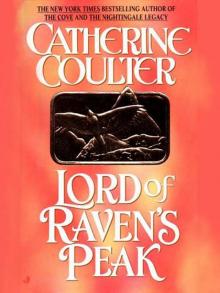 Lord of Raven's Peak
Lord of Raven's Peak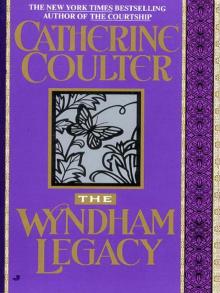 The Wyndham Legacy
The Wyndham Legacy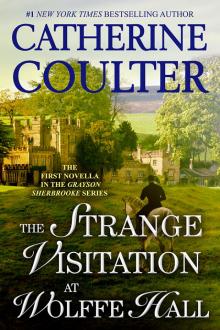 The Strange Visitation at Wolffe Hall
The Strange Visitation at Wolffe Hall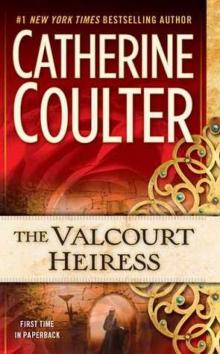 The Valcourt Heiress
The Valcourt Heiress Bombshell
Bombshell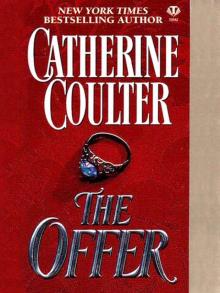 The Offer
The Offer The Edge
The Edge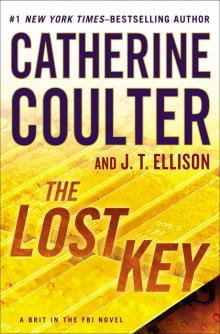 The Lost Key
The Lost Key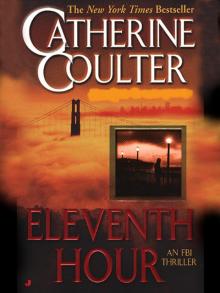 Eleventh Hour
Eleventh Hour Blindside
Blindside Devil's Daughter
Devil's Daughter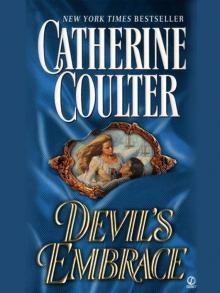 Devil's Embrace
Devil's Embrace Earth Song
Earth Song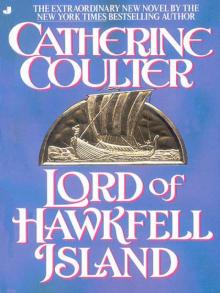 Lord of Hawkfell Island
Lord of Hawkfell Island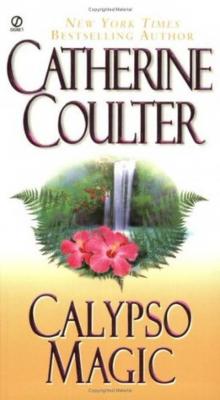 Calypso Magic
Calypso Magic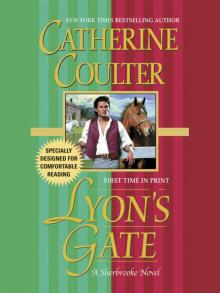 Lyon's Gate
Lyon's Gate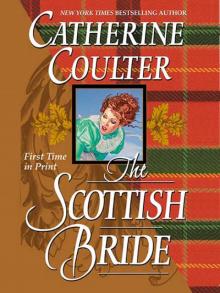 The Scottish Bride
The Scottish Bride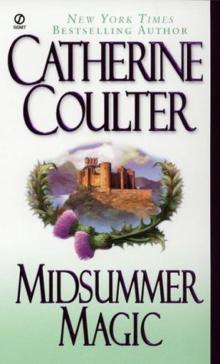 Midsummer Magic
Midsummer Magic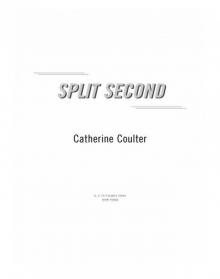 Split Second
Split Second Enigma
Enigma Blowout
Blowout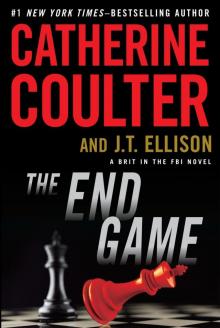 The End Game
The End Game Double Take
Double Take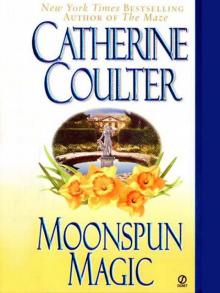 Moonspun Magic
Moonspun Magic The Courtship
The Courtship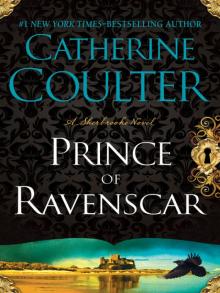 Prince of Ravenscar
Prince of Ravenscar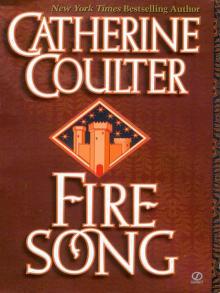 Fire Song
Fire Song Wizard's Daughter
Wizard's Daughter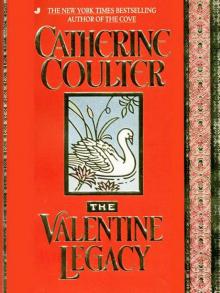 The Valentine Legacy
The Valentine Legacy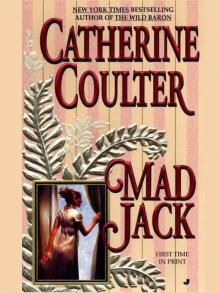 Mad Jack
Mad Jack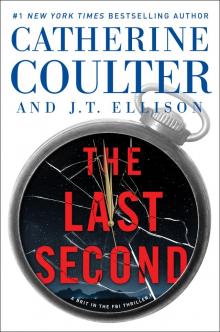 The Last Second
The Last Second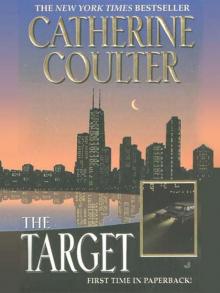 The Target
The Target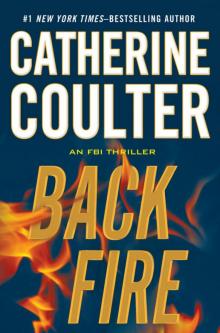 Backfire
Backfire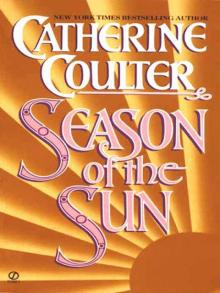 Season of the Sun
Season of the Sun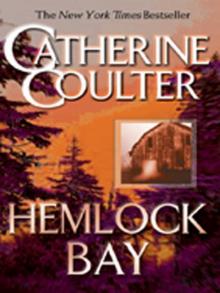 Hemlock Bay
Hemlock Bay Insidious
Insidious Riptide
Riptide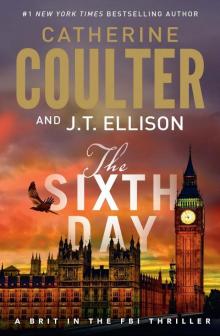 The Sixth Day
The Sixth Day Secret Song
Secret Song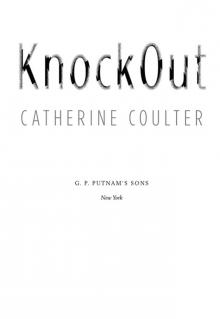 KnockOut
KnockOut Jade Star
Jade Star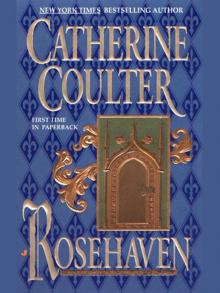 Rosehaven
Rosehaven The Hellion Bride
The Hellion Bride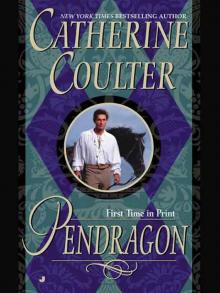 Pendragon
Pendragon Vortex
Vortex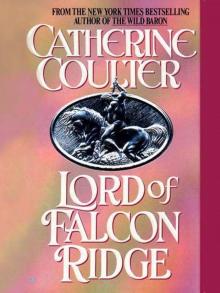 Lord of Falcon Ridge
Lord of Falcon Ridge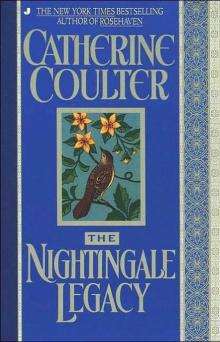 The Nightingale Legacy
The Nightingale Legacy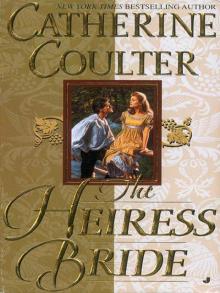 The Heiress Bride
The Heiress Bride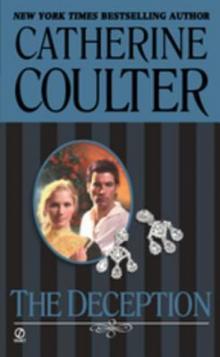 The Deception
The Deception The Maze
The Maze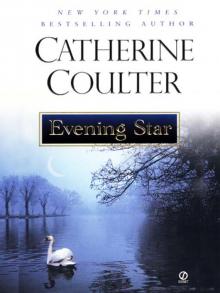 Evening Star
Evening Star Wild Star
Wild Star The Final Cut
The Final Cut Paradox
Paradox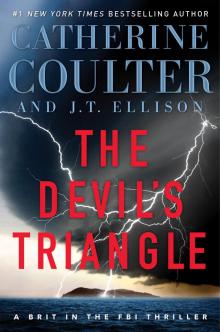 The Devil's Triangle
The Devil's Triangle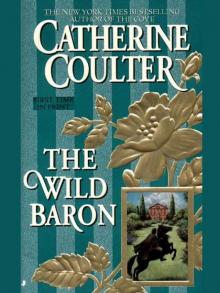 The Wild Baron
The Wild Baron Point Blank
Point Blank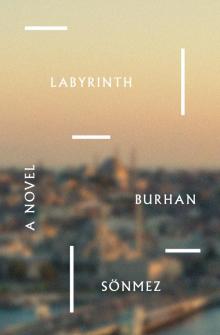 Labyrinth
Labyrinth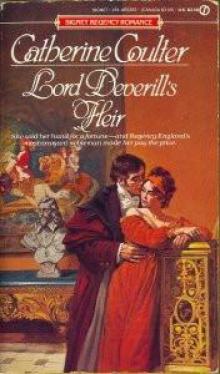 Lord Deverill's Heir
Lord Deverill's Heir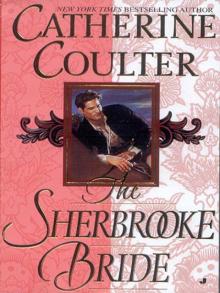 The Sherbrooke Bride
The Sherbrooke Bride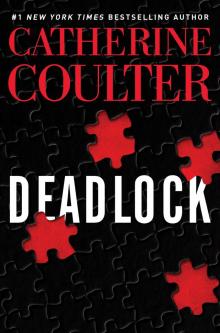 Deadlock
Deadlock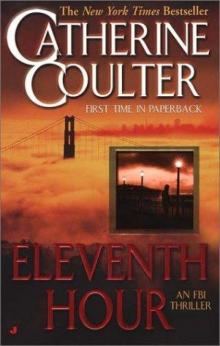 Eleventh Hour f-7
Eleventh Hour f-7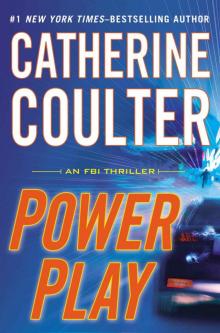 Power Play (An FBI Thriller)
Power Play (An FBI Thriller)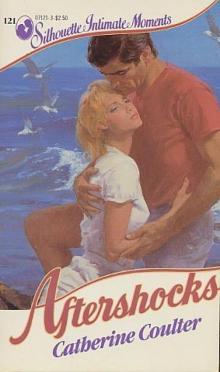 Aftershocks
Aftershocks Sherbrooke Twins tb-8
Sherbrooke Twins tb-8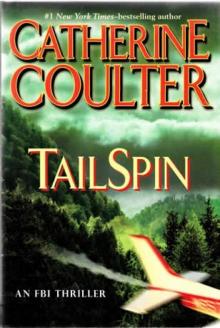 Tail Spin ft-12
Tail Spin ft-12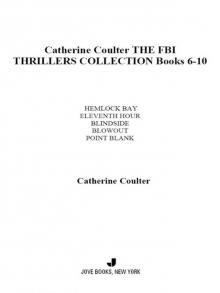 The FBI Thrillers Collection
The FBI Thrillers Collection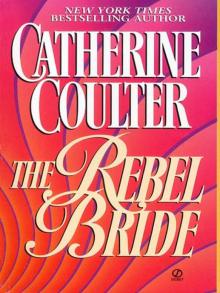 The Rebel Bride
The Rebel Bride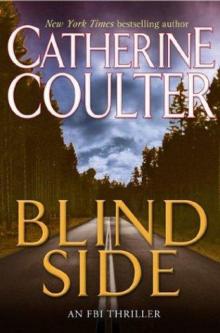 Blindside f-8
Blindside f-8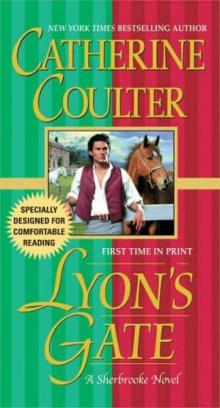 Lyons Gate tb-9
Lyons Gate tb-9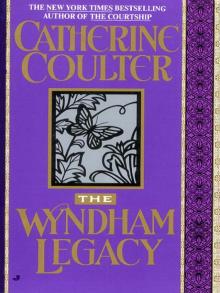 Wyndham Legacy
Wyndham Legacy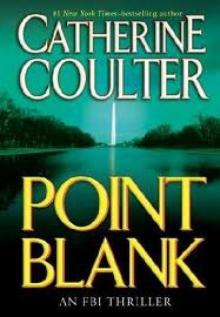 Point Blank f-10
Point Blank f-10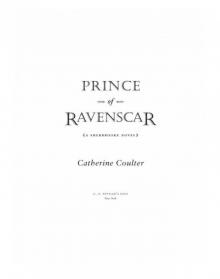 The Prince of Ravenscar
The Prince of Ravenscar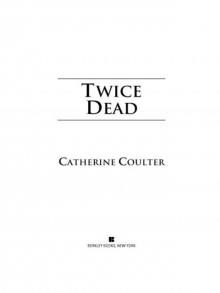 Twice Dead
Twice Dead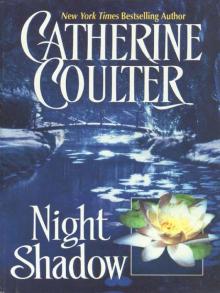 Night Shadow
Night Shadow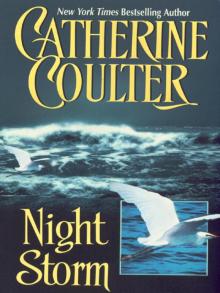 Night Storm
Night Storm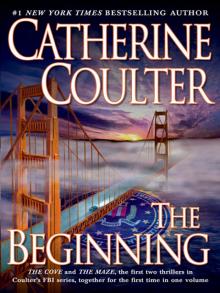 The Beginning
The Beginning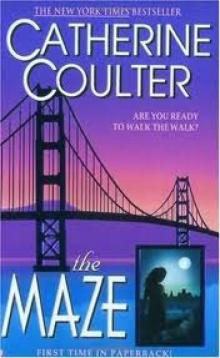 The Maze ft-2
The Maze ft-2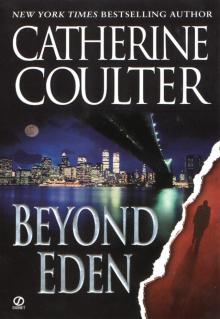 Beyond Eden
Beyond Eden The FBI Thrillers Collection: Vol 11-15
The FBI Thrillers Collection: Vol 11-15 FALSE PRETENSES
FALSE PRETENSES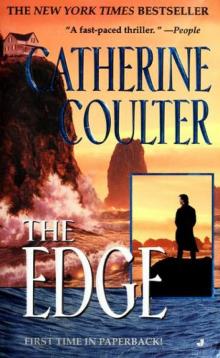 The Edge f-4
The Edge f-4 Bombshell (AN FBI THRILLER)
Bombshell (AN FBI THRILLER)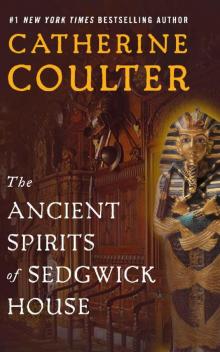 The Ancient Spirits of Sedgwick House (Grayson Sherbrooke's Otherworldly Adventures Book 3)
The Ancient Spirits of Sedgwick House (Grayson Sherbrooke's Otherworldly Adventures Book 3)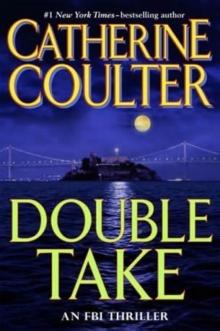 Double Take ft-11
Double Take ft-11 The Heir
The Heir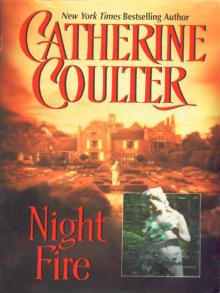 Night Fire
Night Fire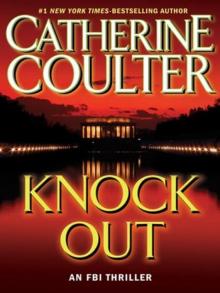 KnockOut ft-13
KnockOut ft-13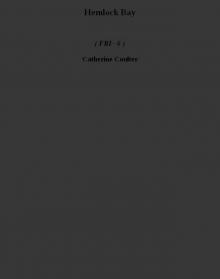 Hemlock Bay f-6
Hemlock Bay f-6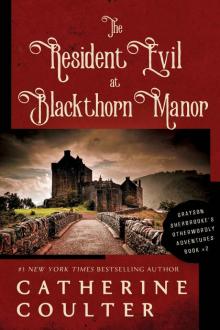 The Resident Evil at Blackthorn Manor (Kindle Single) (Grayson Sherbrooke's Otherworldly Adventures Book 2)
The Resident Evil at Blackthorn Manor (Kindle Single) (Grayson Sherbrooke's Otherworldly Adventures Book 2)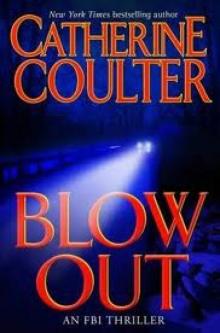 Blowout ft-9
Blowout ft-9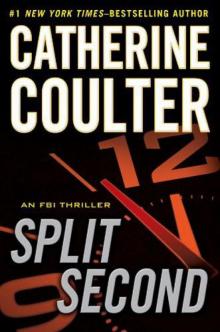 Split Second f-15
Split Second f-15 The Sherbrooke Series Novels 1-5
The Sherbrooke Series Novels 1-5 Impulse
Impulse Paradox (An FBI Thriller Book 22)
Paradox (An FBI Thriller Book 22)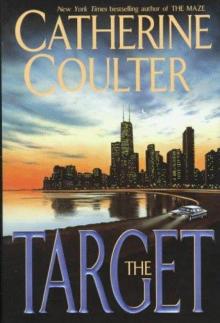 The Target f-3
The Target f-3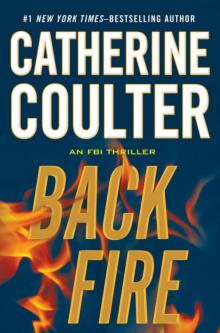 Backfire fst-16
Backfire fst-16 Born To Be Wild
Born To Be Wild Wizards Daughter tb-10
Wizards Daughter tb-10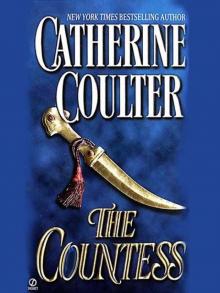 The Countess
The Countess